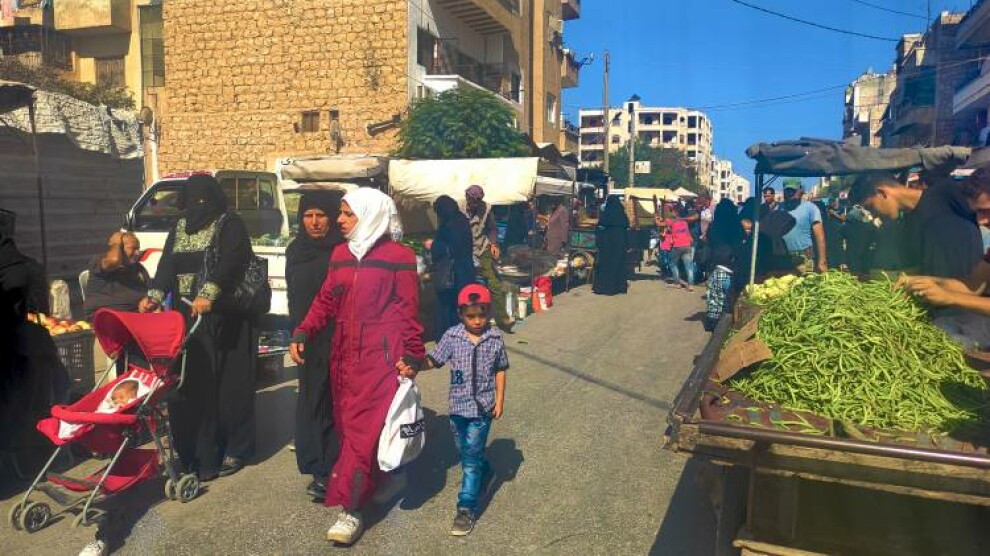Idlib's widows facing poverty, displacement, and exploitation

Suhair Al-Adlbi
The Syrian civil war has affected the Syrian society in general, especially women. Women have faced the largest impact of suffering because the war has turned them into widows, who have the responsibility of raising children under difficult living conditions.
Hasnaa Al-Ahmad (30) doesn’t have any educational background or experience, so she went to search for a job that would enable her to earn money to secure the requirements of her children. She has worked in selling used clothes in the markets of Idlib, to provide food for her four children. Her husband died in the prisons of the Syrian regime.
Hasnaa Al-Ahmad says that her husband was arrested at one of the Syrian regime's checkpoints on the 25th of August 2016 while he was on his way to Hama governorate to obtain his passport, “I tried to ask about him and his fate for a period of time, I learned that he had passed away under torture, and I confirmed the news after seeing his picture among the images published by Caesar.”
Caesar is the Syrian officers who left the Syrian regime, and published 55,000 pictures of 11,000 detainees in 2014, who was killed under torture, according to the Federal Bureau of Investigation (FBI).
Hasnaa Al-Ahmad says, “My great sadness for my husband did not prevent me from thinking about the future of my children, at the beginning of 2018, I sold my gold jewelry and bought goods for their price and started selling used clothes".
Hasnaa Al-Ahmad has challenged the community's view of the inferiority of the widowed women; she has challenged the customs and traditions that prevent women from going out and working, and depending on her to take care of her children without asking anyone for help.
Hasnaa Al-Ahmad is somewhat lucky as she is able to secure a job of her own to help her and her children to live a decent life, while many widows are subjected to exploitation by employers due to their urgent need to accept any work despite the long hours and low wages, and there is unequal pay between women and men.
Hanan al-Najm (28) has worked along with a number of women in a workshop by packaging, pressing and preparing dried figs to be exported with low wages those not exceeding 4,000 Syrian Pounds, an amount that is not sufficient for her and her three children to secure the minimum requirements for living under the deteriorating economic conditions in the country.
Hanan Al-Najm lost her husband, who was killed during the recent military campaign of the Syrian regime against her city, Khan Sheikhoun in 2019. She is one of the displaced people settled in the Sarmada city north of Idlib. Since the beginning of 2020, she has worked in a workshop, and she says, "I feel injustice when I work all-day for a low wage, I cannot ask for an increase in the wage because I will face the usual answer from the owner of the workshop (if you do not like the work and the wages, you can leave it whenever you want).
Women who lost their husband rarely find a job due to the high price prevailing in the country, and this situation sometimes drives some women to marry again.
Mays Al-Jaber (23) lost her husband in a traffic accident at the end of 2018. She has a one-year-old daughter and they lived in the house of her husband's family. In 2020, her father decided to marry her to another man by saying "she cannot continue her life alone after her husband’s death, society has no mercy on the widow, and her second marriage is a natural right, which is a protect her from society, customs, and traditions", so she left her daughter with great sadness in the house of her husband's family.
Mays Al-Jaber, has become the second wife of a man 15 years older than her, she has moved to the Qah border camp in Idlib along with her husband. She says, "I am not happy with my second marriage and I miss my daughter very much."
The social counselor, Lama Al-Tawil, has explained that widows in the Syrian society suffer from a negative view that deprives them of their most important rights, such as the right to work and to learn. They have to perform their natural role in life told by their relatives, society. And some militant factions have forbidden women and men to work in the same workplaces and this ban has reduced women’s job opportunities within civil society organizations, directorates, and civil institutions.
But, the widowed women can break those restrictions and barriers, and continue their life and fulfill their responsibility despite all the obstacles they have faced, because the widowed women cannot sit at home to satisfy the community that monitors their movements and to wait for someone who secures their needs and searches for decent work that guarantees them and their children and to live with dignity, away from asking people and seeking their sympathy.
Lama Al-Tawil calls on all humanitarian organizations that working in Idlib and northern Syria to work to relieve widows and help them by providing them with comprehensive services, such as empowering them professionally, economically and psychologically, and securing guarantees for their children.
According to local organizations, there are 37,000 widows in Idlib province and its countryside with their 190,000 children under the age of 18 and many women have lost their husbands and children have lived under difficult conditions in camps in Idlib countryside.
